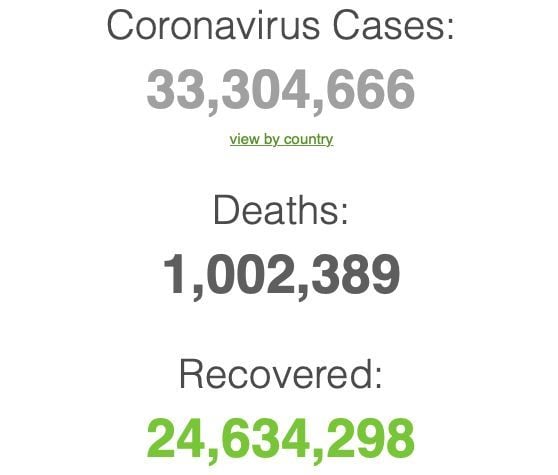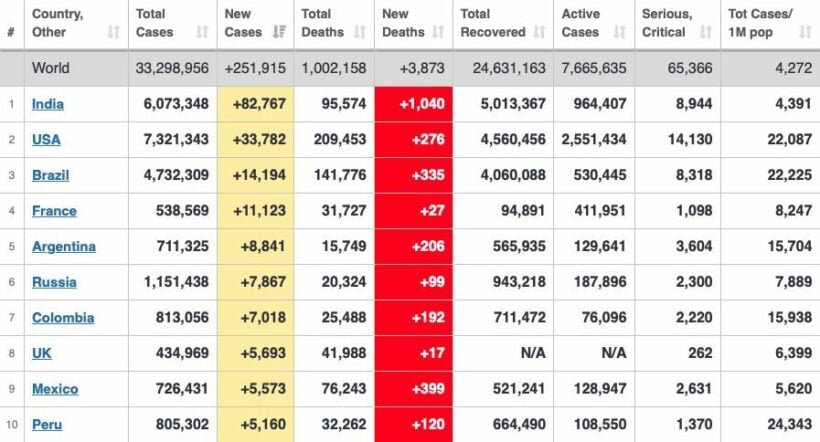Covid-19 deaths surpass 1 million whilst more reports emerge about former patients’ “brain fog”

The world’s Covid-19-related deaths has passed the 1 million mark overnight as the the cycle of the world’s lockdowns and re-openings are getting mixed results. As of this morning, Thai time, the number of total deaths has reached 1,002,389, with 4,000-6,000 deaths still being recorded, globally, every day. And rising. On a more positive note, the number of daily deaths continues to level off, even dropping some weeks, as treatments continue to improve and the virus is better understood. At this stage, officially, only 0.42% of the world’s population has so far been infected, according to worldometers.info.
The milestone comes in a week where another report from the UK catalogues the “brain fog” experienced by former Covid-19 sufferers.

The current hotspots for the virus, now 9 months in circulation, of new daily cases is led by India. Yesterday, India added 82,000+ cases to the world total whilst the US is showing a resurgence in new cases after dropping the average down during August. There is also a resurgence in new cases in parts of Europe, including the UK, which is now recording more new cases than it was at its peak in the first wave in April and May this year. The following graphs records the top 10 countries for new Covid-19 cases recorded yesterday…

SOURCE: worldometers.info
Both South America and India are showing the highest rates of new cases, in pure numbers, whilst US health authorities are concerned about the latest surge in new cases as the country starts to head into its autumn and cooler weather.
Meanwhile, more former Covid-19 patients, even those who only suffered mild symptoms, continue to report about long-term effects from the coronavirus.
In Canada, some 130,000 Canadians have recovered but some patients report that they’re experiencing “debilitating side effects” months after their infection. Canadian scientists report that they are finding some of the long-term effects of Covid-19 include heart damage as well as neurological issues like “brain fog” and “difficulty thinking”. Other patients are reporting hair loss, fatigue and even painful lesions called “Covid toes,” many weeks or even months after infection.
One study based out of Italy reports that nearly 90% of patients who have recovered from Covid-19 reported at least one persistent symptom two months later.
39 doctors wrote about these “long-haulers” and their battle with Covid-19 and their persistent symptoms in a manifesto published in the British Medical Journal. Following the report, the doctors called on politicians, scientists and public health officials to conduct more research into chronic Covid-19 symptoms and to create additional clinical services.
“Failure to understand the underlying biological mechanisms causing these persisting symptoms risks missing opportunities to identify risk factors, prevent chronicity, and find treatment approaches for people affected now and in the future.”
The reports also defined the affected patients as not in the current list of “at risk” Covid-19 patients – usually elderly with underlying conditions – but instead representing a much wider demographic of younger and healthy patients who were experiencing the post-Covid symptoms.
SOURCE: BBC | CTV News
Latest Thailand News
Follow The Thaiger on Google News:


























